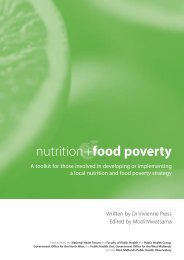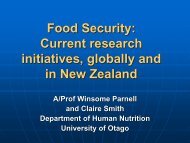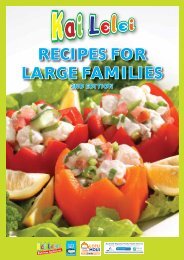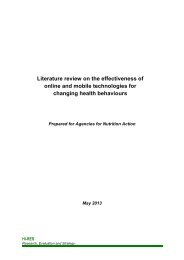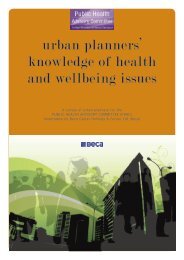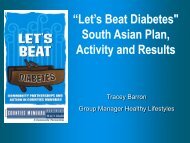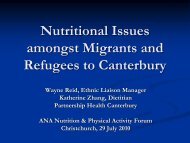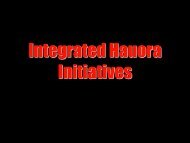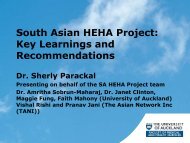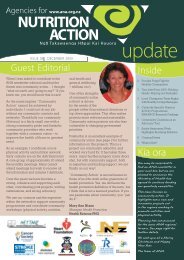enhancing food security and physical activity for maori, pacific and ...
enhancing food security and physical activity for maori, pacific and ...
enhancing food security and physical activity for maori, pacific and ...
- No tags were found...
You also want an ePaper? Increase the reach of your titles
YUMPU automatically turns print PDFs into web optimized ePapers that Google loves.
Enhancing Food Security <strong>and</strong> Physical Activity <strong>for</strong> Māori, Pacific <strong>and</strong> Low-income Peoples3.2 Iwi pan tribal development of traditional Māori <strong>food</strong>sourcesChristina McKerchar <strong>and</strong> Craig HetaSummaryWorkshop participants suggested ‘increasing Iwi <strong>and</strong> other pan-tribal investment/economic development in traditional Māori <strong>food</strong> sources/supply as a possibleintervention to enhance <strong>food</strong> <strong>security</strong> <strong>for</strong> Māori.Economic development can potentially impact in two ways:1. Increase <strong>food</strong> supply e.g Mataitai reserves, community gardens2. Creation of jobs: e.g aquaculture, horticultureThe role of Iwi/Pan Tribal Organisations in <strong>enhancing</strong> <strong>food</strong> <strong>security</strong> <strong>for</strong> Māori through thedevelopment of traditional Māori <strong>food</strong> sources is an area <strong>for</strong> future consideration <strong>and</strong>research as it offers some potential <strong>for</strong> culturally specific interventions.It is recommended that:• funding is allocated to research into the role of iwi <strong>and</strong> pan tribal organisations in<strong>food</strong> <strong>security</strong> <strong>and</strong> economic development through the development of traditionalMāori <strong>food</strong> sources,• the Crown engages with iwi <strong>and</strong> pan tribal organisations about how developmentof traditional <strong>food</strong>-related projects can be supported,• iwi <strong>and</strong> pan tribal organisations further investigate opportunities to developtraditional <strong>food</strong>-related projects to enhance <strong>food</strong> <strong>security</strong> <strong>and</strong> economicdevelopment.Problem definitionParticipants at the Māori specific workshops suggested increasing iwi <strong>and</strong> other pantribalinvestment in traditional Māori <strong>food</strong> sources as a possible intervention, <strong>and</strong>economic development through the development of traditional Māori <strong>food</strong> sources.Māori have reduced access to traditional <strong>food</strong>s compared with pre-European times. Thecolonisation of New Zeal<strong>and</strong> resulted in loss of Māori l<strong>and</strong> with which to grow or gatherboth traditional <strong>and</strong> modern <strong>food</strong>s, as well as loss of an economic base; whilst pollution<strong>and</strong> over-fishing have depleted sea<strong>food</strong> stocks. 1 There may also be a loss of traditional<strong>food</strong>-gathering skills. 2 This chapter looks at iwi/pan tribal development of traditionalMāori <strong>food</strong> sources to promote <strong>food</strong> <strong>security</strong> <strong>and</strong> economic development.Iwi economic development in traditional <strong>food</strong> sourcesIn pre-European times, <strong>food</strong> was gathered from the bush, the sea <strong>and</strong> the rivers. Time<strong>and</strong> energy were expended to secure a safe, year-long <strong>food</strong> supply. Food wasacknowledged as coming from atua (gods) <strong>and</strong> many different tikanga (customs) wereestablished governing how different <strong>food</strong>s were collected, cultivated, stored, prepared<strong>and</strong> cooked. 3 4 5 680



